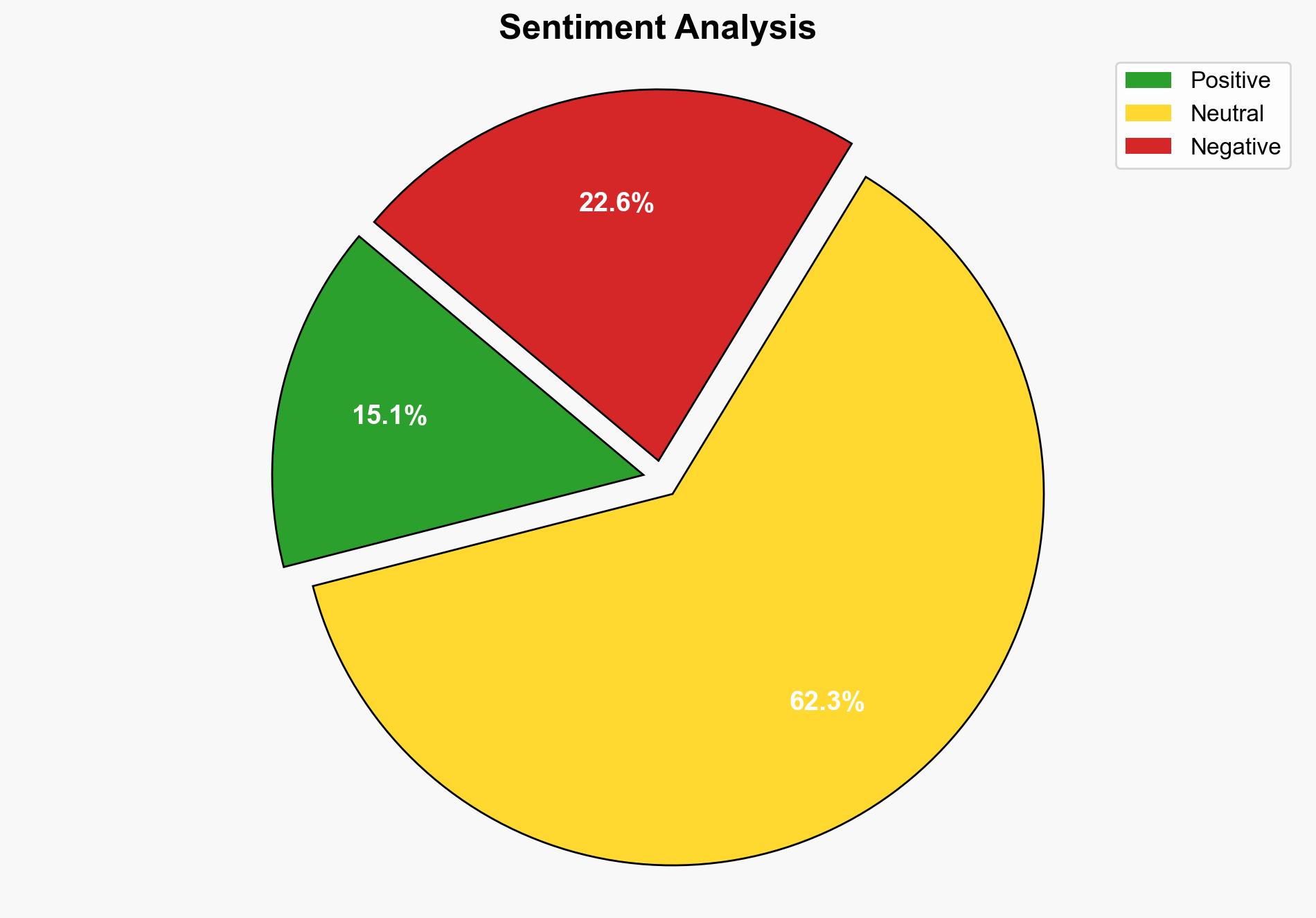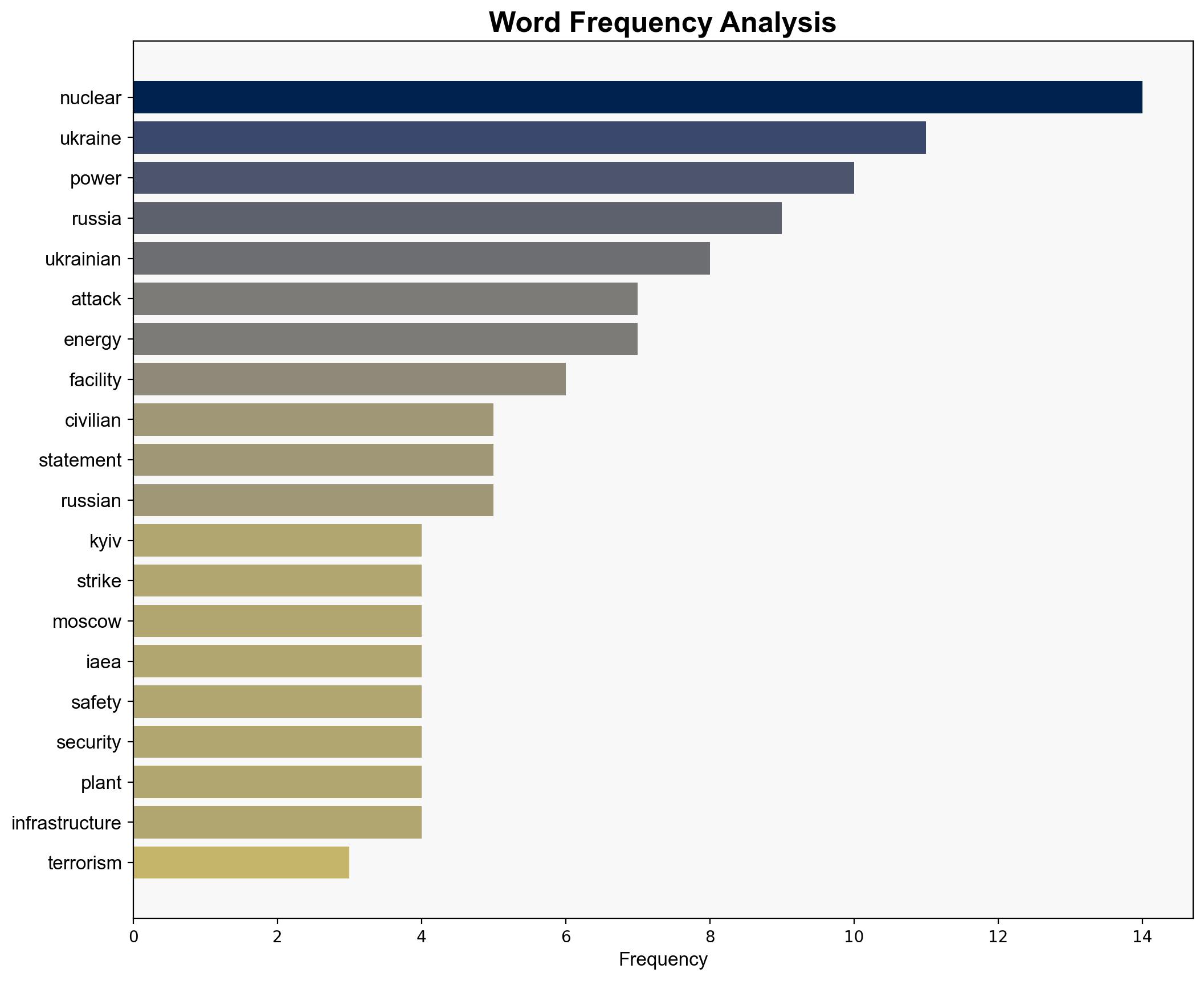Kyiv Accuses Russia Of ‘Nuclear Terrorism’ With Strikes On Power Substations – Globalsecurity.org
Published on: 2025-11-03
Intelligence Report: Kyiv Accuses Russia Of ‘Nuclear Terrorism’ With Strikes On Power Substations – Globalsecurity.org
1. BLUF (Bottom Line Up Front)
The most supported hypothesis is that Russia is engaging in strategic attacks on Ukraine’s energy infrastructure to destabilize the country’s nuclear safety and exert psychological pressure. Confidence level is moderate due to the complexity of verifying intentions and the presence of conflicting narratives. Recommended action includes reinforcing international monitoring and enhancing defensive measures around critical infrastructure.
2. Competing Hypotheses
1. **Hypothesis A**: Russia is deliberately targeting Ukraine’s energy infrastructure, including power substations, to undermine nuclear safety and apply psychological pressure, constituting nuclear terrorism.
2. **Hypothesis B**: The strikes on power substations are collateral damage from broader military operations aimed at degrading Ukraine’s overall infrastructure and are not specifically intended to threaten nuclear safety.
Using ACH 2.0, Hypothesis A is better supported by the specific targeting of substations critical to nuclear facilities and the timing of these attacks amidst heightened tensions. Hypothesis B lacks direct evidence linking the strikes to broader military objectives without nuclear implications.
3. Key Assumptions and Red Flags
– **Assumptions**: Hypothesis A assumes intentionality in targeting nuclear-related infrastructure. Hypothesis B assumes that the strikes are not specifically aimed at nuclear facilities.
– **Red Flags**: Russia’s denial of targeting civilian infrastructure contrasts with evidence of repeated strikes near nuclear sites. The lack of independent verification of the exact targets and intentions raises concerns.
– **Blind Spots**: Limited access to real-time intelligence from the ground and potential bias in reporting from involved parties.
4. Implications and Strategic Risks
– **Nuclear Safety**: Continued strikes could lead to a nuclear incident, escalating regional and international tensions.
– **Geopolitical**: Increased international condemnation could lead to further isolation of Russia and potential escalation of sanctions.
– **Psychological**: The threat of nuclear terrorism could demoralize the Ukrainian population and strain international support.
– **Economic**: Disruption of energy infrastructure impacts Ukraine’s economy and could lead to broader regional instability.
5. Recommendations and Outlook
- Enhance international monitoring and verification through organizations like the IAEA to ensure transparency and accountability.
- Strengthen defensive measures around critical infrastructure, particularly nuclear facilities, to mitigate risks.
- Scenario Projections:
- **Best Case**: Diplomatic interventions lead to a cessation of attacks on energy infrastructure.
- **Worst Case**: A nuclear incident occurs, prompting international military intervention.
- **Most Likely**: Continued sporadic attacks with increased international diplomatic efforts to de-escalate tensions.
6. Key Individuals and Entities
– **Rafael Grossi**: Chief of the International Atomic Energy Agency (IAEA), involved in monitoring nuclear safety.
– **Volodymyr Zelenskyy**: Ukrainian President, leading the response to Russian actions.
7. Thematic Tags
national security threats, cybersecurity, counter-terrorism, regional focus




